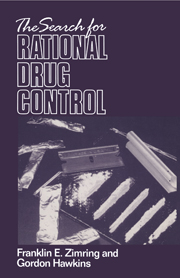Book contents
- Frontmatter
- Contents
- List of tables and figures
- Preface
- Acknowledgments
- Part One The drug problem
- Introduction
- 1 Ideology and policy: A look at the National Drug Control Strategy
- 2 What is a drug? And other basic issues
- 3 Prohibitions and the lessons of history
- 4 The wrong question: Critical notes on the decriminalization debate
- Part Two The drug control policy process
- Appendix: Estimates of illicit drug use - a survey of methods
- References
- Index
3 - Prohibitions and the lessons of history
Published online by Cambridge University Press: 08 January 2010
- Frontmatter
- Contents
- List of tables and figures
- Preface
- Acknowledgments
- Part One The drug problem
- Introduction
- 1 Ideology and policy: A look at the National Drug Control Strategy
- 2 What is a drug? And other basic issues
- 3 Prohibitions and the lessons of history
- 4 The wrong question: Critical notes on the decriminalization debate
- Part Two The drug control policy process
- Appendix: Estimates of illicit drug use - a survey of methods
- References
- Index
Summary
It is a standard complaint that modern policy discussions, though replete with references to cost and benefit, lack the dimension of historical example and understanding. From the energy crisis to the progressive income tax, it is difficult to find a policy debate in which it has not been claimed that the lessons of history are being ignored. The patron saint of this kind of incantation is, of course, the philosopher George Santayana and the canonical text in his observation that “those who cannot remember the past are condemned to repeat it” (Santayana, 1906, p. 284).
Writing about drug abuse in the New York Times in 1970, Gore Vidal remarked that America had “always existed in a kind of time vacuum: we have no public memory of anything that happened before last Tuesday” (Vidal, 1972, p. 374). But even given the dismal norm for historical awareness in policy debates, the immunity to historical evidence that characterizes the contemporary discussion of drugs in the United States is peculiarly pervasive. In recent years, historians have begun to compile some accounts of America's adventures with psychoactive substances and their control. But for the most part their work stands unrecognized or ignored by participants in policy debates. So even though the historical record is incomplete in a number of respects, the knowledge base available for those formulating policy is far more adequate than the degree of historical sophistication displayed in either the political arena or most scholarly discussions would suggest.
- Type
- Chapter
- Information
- The Search for Rational Drug Control , pp. 45 - 81Publisher: Cambridge University PressPrint publication year: 1992



